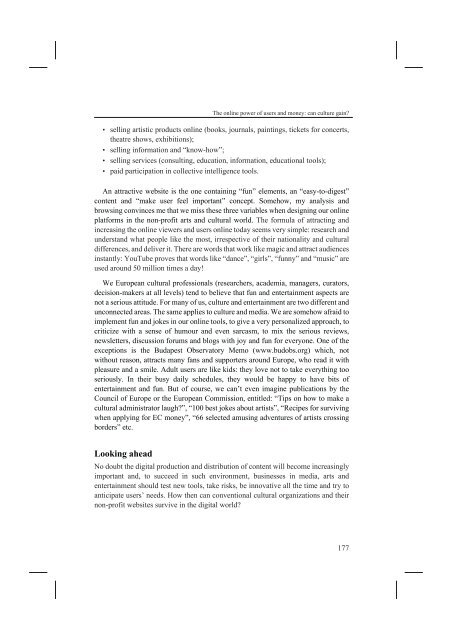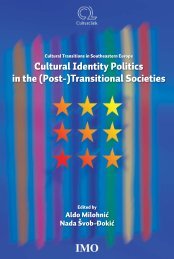D:\Documents and Settings\Ana\My Documents\Biserka-knjiga ...
D:\Documents and Settings\Ana\My Documents\Biserka-knjiga ...
D:\Documents and Settings\Ana\My Documents\Biserka-knjiga ...
Create successful ePaper yourself
Turn your PDF publications into a flip-book with our unique Google optimized e-Paper software.
• selling artistic products online (books, journals, paintings, tickets for concerts,<br />
theatre shows, exhibitions);<br />
• selling information <strong>and</strong> “know-how”;<br />
• selling services (consulting, education, information, educational tools);<br />
• paid participation in collective intelligence tools.<br />
An attractive website is the one containing “fun” elements, an “easy-to-digest”<br />
content <strong>and</strong> “make user feel important” concept. Somehow, my analysis <strong>and</strong><br />
browsing convinces me that we miss these three variables when designing our online<br />
platforms in the non-profit arts <strong>and</strong> cultural world. The formula of attracting <strong>and</strong><br />
increasing the online viewers <strong>and</strong> users online today seems very simple: research <strong>and</strong><br />
underst<strong>and</strong> what people like the most, irrespective of their nationality <strong>and</strong> cultural<br />
differences, <strong>and</strong> deliver it. There are words that work like magic <strong>and</strong> attract audiences<br />
instantly: YouTube proves that words like “dance”, “girls”, “funny” <strong>and</strong> “music” are<br />
used around 50 million times a day!<br />
We European cultural professionals (researchers, academia, managers, curators,<br />
decision-makers at all levels) tend to believe that fun <strong>and</strong> entertainment aspects are<br />
not a serious attitude. For many of us, culture <strong>and</strong> entertainment are two different <strong>and</strong><br />
unconnected areas. The same applies to culture <strong>and</strong> media. We are somehow afraid to<br />
implement fun <strong>and</strong> jokes in our online tools, to give a very personalized approach, to<br />
criticize with a sense of humour <strong>and</strong> even sarcasm, to mix the serious reviews,<br />
newsletters, discussion forums <strong>and</strong> blogs with joy <strong>and</strong> fun for everyone. One of the<br />
exceptions is the Budapest Observatory Memo (www.budobs.org) which, not<br />
without reason, attracts many fans <strong>and</strong> supporters around Europe, who read it with<br />
pleasure <strong>and</strong> a smile. Adult users are like kids: they love not to take everything too<br />
seriously. In their busy daily schedules, they would be happy to have bits of<br />
entertainment <strong>and</strong> fun. But of course, we can’t even imagine publications by the<br />
Council of Europe or the European Commission, entitled: “Tips on how to make a<br />
cultural administrator laugh?”, “100 best jokes about artists”, “Recipes for surviving<br />
when applying for EC money”, “66 selected amusing adventures of artists crossing<br />
borders” etc.<br />
Looking ahead<br />
The online power of users <strong>and</strong> money: can culture gain?<br />
No doubt the digital production <strong>and</strong> distribution of content will become increasingly<br />
important <strong>and</strong>, to succeed in such environment, businesses in media, arts <strong>and</strong><br />
entertainment should test new tools, take risks, be innovative all the time <strong>and</strong> try to<br />
anticipate users’ needs. How then can conventional cultural organizations <strong>and</strong> their<br />
non-profit websites survive in the digital world?<br />
177



